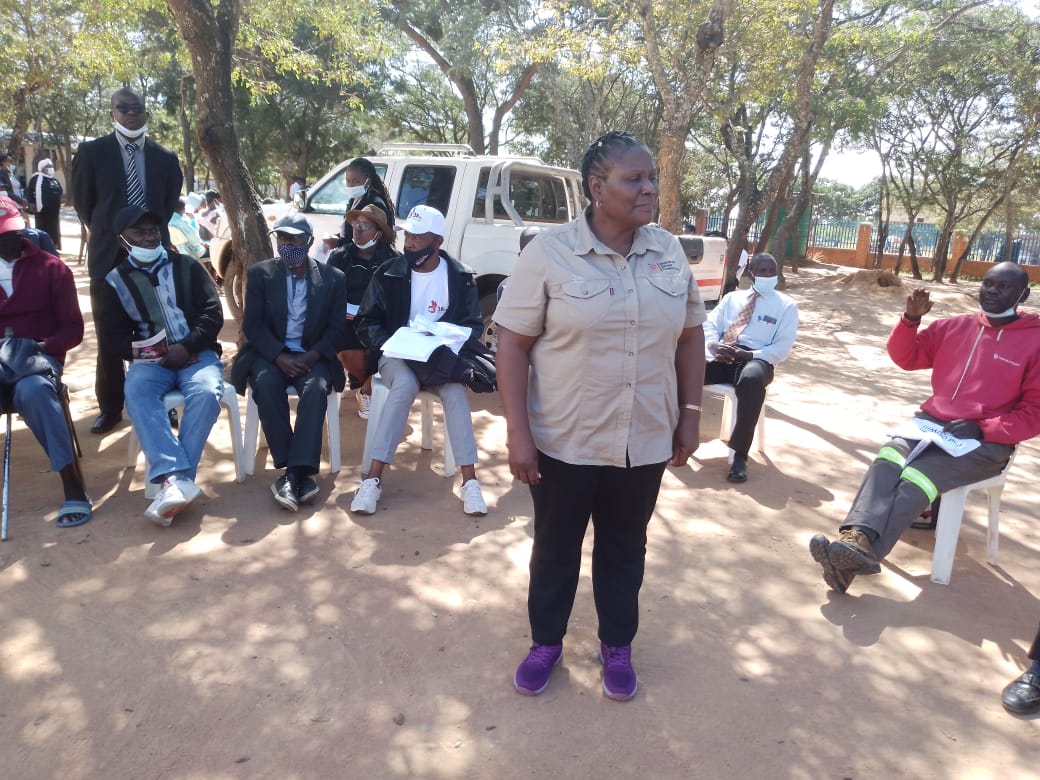|
Getting your Trinity Audio player ready...
|
In the quest to reduce the prevalence of child marriages, one-stop centres provided under the Spotlight Initiative are playing a critical role in curbing the vice.
This emerged today in Epworth at a national inquiry meeting on child marriages and sexual exploitation and abuse of young girls including those with disabilities. Participants were drawn from the seven wards of Epworth.
This important inquiry process has been organized by the Zimbabwe Gender Commission (ZGC) n in partnership with the United Nations Development Programme (UNDP) as well as the UN Women under the Spotlight Initiative to provide a platform for engagement to collectively discuss, reflect and share information on this issue of child marriages which is of mutual concern. In addition, the Inquiry process allows the Commission to gather evidence, information, and testimonies from survivors, key-informant witnesses, and stakeholders as it tries to get deeper insights and understand the underlying issues around the practice.
Sharing information gathered through group discussions with Epworth community where participants (mostly) women were guided by a questionnaire from the Zimbabwe Gender Commission, Shumirai Mahungana, the Acting District Development Coordinator for Epworth thanked stakeholders for establishing a one-stop centre in Epworth.
“Epworth is fortunate to have a Spotlight Initiative project where we have a One-Stop Centre located within the locality where services for gender-based violence victims are offered in privacy. There is also counseling, legal advice, expertise, and law enforcement through the Zimbabwe Republic Police’s Victim Friendly Unit to handle criminal cases. In Harare, 2 areas have been selected to benefit from the Spotlight Initiative of which Epworth is one of the beneficiaries as well as Hopley.
“In this meeting, we have government departments and other partners handling issues to do with child welfare to contribute to the inquiry. It’s an important exercise that will contribute to the welfare of women and children. In Epworth, we have high statistics rates of child marriages recorded at health centres. Today, around 300 participants turned up for the National Inquiry on Child Marriages. Among the participants are people with disabilities who face challenges in trying to express themselves such that perpetrators easily get away with child marriage offences,” Mahungana said.
Speaking on behalf of the ZGC Chairperson, Commissioner Naome Chimbetete said the National Inquiry is coming against a background of the high prevalence of child marriages, sexual exploitation, and abuse of young girls in the country, particularly within the apostolic sect which is a cause of great concern for the Commission.
“The situation has challenged the Commission to take incisive steps to amplify its voice on the issue into the national discourse. This national inquiry will red flag the social injustices while catalysing responsive mechanisms aimed at redressing such social dysfunction,” Commissioner Chimbetete said.
The Inquiry, among other objectives, is meant to gather statements from the complainants and witnesses on the Sexual Exploitation and Abuse of Young Girls and Child Marriages in the Apostolic Sect. It is also meant for stakeholders to understand the practice, customs, laws and other drivers of sexual exploitation and abuse of young girls and child marriages within the Apostolic Sects.
Stakeholders will also compile the information as part of the record of the investigations into the prevalence of Sexual Exploitation and Abuse of Young Girls and/or Child Marriages within the Apostolic Sect as well as to identify the harmful effects of Sexual Exploitation and Abuse of Young Girls in the Apostolic Sects.
The Zimbabwe Gender Commission (ZGC) is one of the five Independent Commissions established in terms of Section 245 of the Constitution of Zimbabwe Amendment (No.20) Act, 2013(hereinafter referred to as the Constitution) and operationalized through the Gender Commission Act (Chapter 10:31) (hereinafter referred to as the Act). Section 246 of the Constitution Act mandates the Commission inter alia to; monitor gender equality issues, conduct research, investigate gender-related violations, and recommend changes to laws and practices. The key function of the Commission in terms of the Act is investigation and making of recommendations on the removal of barriers to the attainment of full gender equality. The conduct of such investigations fits squarely into the provisions of part iii of the Act.
Sexual Exploitation and Abuse of Young Girls and Child Marriages (including those with disabilities) is indeed a systemic barrier prejudicial to gender equality, gender equity, and gender mainstreaming as envisaged by the Act. The negative effects of child marriages insofar as it curtails the development of young girls and exposes them to health risks and SGBV cannot be overemphasized. The Commission is therefore duty-bound to carry out full investigations into these matters. The conduct of such investigations affords the Commission an opportunity to identify a sector/social stratum that is severely affected by the identified barrier, notify the nation through a government gazette and adverts, and invite complainants and witnesses to make submissions. Thereafter the Commission will have leeway to summon persons and institutions which it deems fit to respond to the complaints. The respondents’ list will also involve various duty bearers who are supposed to take a lead in rectifying the identified systemic issues.
Whilst the initial notice inviting complainants and witnesses was targeting issues surrounding harmful religious practices in the Apostolic Sects; the Commission became overwhelmed by submissions from various stakeholders indicating that the scourge has spread beyond that named sector. The main drivers are vulnerabilities of young women, poverty, the Covid-19 pandemic, and the measures put in place to combat its spread and inadequacy of SRHRs education. It was also noted in ZGC preliminary investigation that girls with disabilities are silent victims and hence the need to not only target them but to mainstream disability in the inquiry as well.
The national inquiry started at the beginning of May and is expected to be completed by the second week of June with all provinces being covered.






